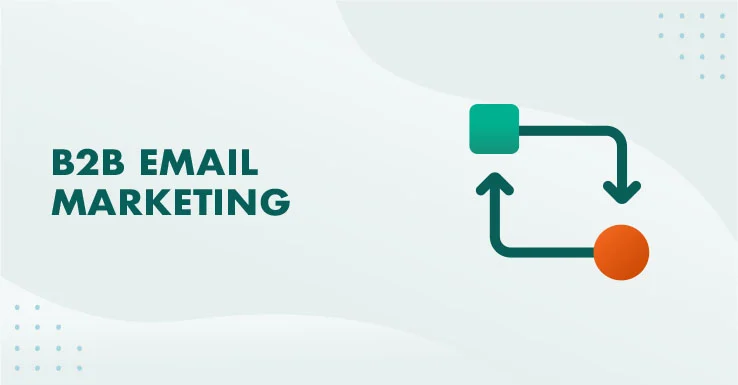
Email marketing is a key strategy in B2B marketing as one of its central tenets of forging meaningful connections between businesses. Email is, therefore, a primary means of building meaningful relationships, driving engagement, and supporting business expansion. This comprehensive guide explores effective B2B email strategies tailored specifically for your company in this competitive arena.
The Significance of B2B Email Marketing
B2B email marketing plays an essential part in businesses’ wider digital strategy for growth. While consumer-based B2C campaigns target individual consumers directly, business-to-business (B2B) emails build relationships among other businesses rather than directly targeting individual consumers.
Here is why email marketing for business growth should include B2B segments:
Nurturing Leads and Conversions:
B2B sales cycles often span longer and involve multiple decision-makers, necessitating email marketing as an effective method for nurturing leads over time by offering relevant and useful content, building rapport with prospects, and leading them through their decision-making processes.
Building Brand Awareness:
Targeted email campaigns help businesses raise and strengthen brand recognition by keeping relevant industry content top of mind for B2B audiences and building trust among customers.
Driving Customer Engagement:
By segmenting contact lists and crafting messages tailored to roles and past interactions, B2B emails foster meaningful connections with prospects and clients.
Educational content, product updates, promotional offers and executive insights spur recipients to open, click and interact regularly. This keeps the brand top-of-mind as an industry authority and solution provider.
Automating engaging sequences at each stage of the buyers’ journey also builds trust and positions the company as a valued partner over time. Increased engagement leads directly to stronger relationships and referrals.
Measurable ROI:
Unlike other channels, email provides complete tracking to tie campaigns directly to business outcomes. Marketers gain clear visibility into opens, clicks, and actions taken. They can attribute pipeline and revenue amounts to emails’ content or targeting refinements.
Segmented reports reveal which audiences or newsletters performed best. This level of insight allows optimizing spending towards high-converting programs or unproductive lists to be cut. With data-backed decisions, marketers maximize email’s contribution to essential metrics like leads, trials, renewals, and sales deals.
Strategies for Effective B2B Email Marketing
Segmentation for Personalization:
Establish and segment B2B email lists according to criteria such as industry, company size, and engagement level in order to deliver personalized content that resonates with specific segments. Doing this increases relevance while simultaneously strengthening engagement.
Educational Content for Thought Leadership:
Make an impression statement in your industry by providing educational and valuable content such as industry insights, whitepapers, case studies or guides demonstrating your expertise while offering tangible value to B2B audiences.
Automated Email Campaigns:
Automated email campaigns can streamline communication and nurture leads effectively. By setting up automated workflows to target content based on user behavior and send it automatically via emails, automated campaigns can provide your B2B audience with relevant and useful info at every point in their buying journey.
Interactive Content for Engagement:
Integrate interactive elements into your B2B emails to increase subscriber engagement with content and encourage further interactions from them. Include surveys, quizzes, and clickable CTAs as additional interactive experiences while encouraging further participation.
Personalized Email Sequences:
Use email sequences that precisely direct B2B prospects through your sales funnel. Tailor messages based on past interactions between recipients and your content to ensure an effective communication strategy.
B2B Email Marketing Best Practices
Optimized for Mobile:
When optimizing emails for optimal mobile experience, consider that many professionals access emails on mobile devices – this ensures a positive user experience and increases engagement.
Clear Call-to-Action (CTA):
B2B emails should always include an inviting Call-to-Action (CTA), be it downloading resources, scheduling demos, or making purchases – to prompt recipients into taking further actions due to these communications.
A/B Testing for Optimization:
Performing A/B testing of various elements in your B2B emails, A/B testing enables you to enhance future campaigns by discovering which versions resonate most strongly with viewers. Experiment with subject lines, content, and visuals until finding one that strikes the perfect chord with readers.
Compliance with Regulations:
Conform with relevant regulations like GDPR and CAN-SPAM to avoid potential legal problems while increasing trust with your target audience.
Conclusion
In conclusion, well-executed B2B email provides a powerful platform for companies to sustain demand, build lifelong relationships, and capture new avenues for growth.
Marketers can continuously engage targets at each stage by leveraging the latest strategies, personalization techniques, and behavioral triggers. Partnering with an expert provider like Rubbics enables harnessing these capabilities through their dedicated work.
Rubbics‘ consultants, designers, and analysts optimize programs from planning to reporting based on individual business objectives and industry verticals. Our solutions seamlessly integrate with other marketing initiatives to strengthen lead generation and ROI.
Taking a strategic, data-driven approach to B2B email as part of a holistic plan is key to thriving long-term in today’s competitive landscape.
